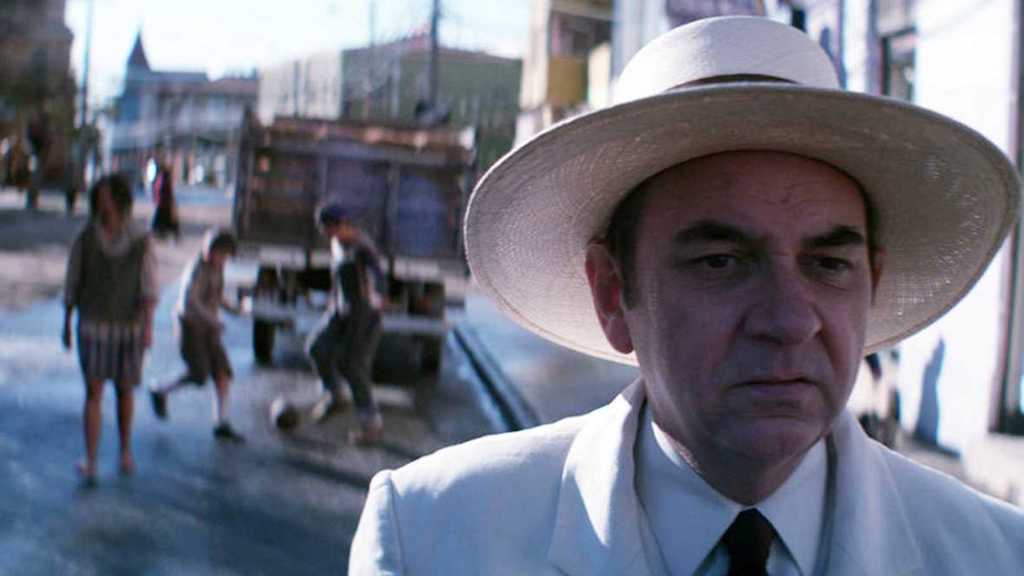Pablo Larraín is a man of ambition. Born into a family of politicians and lawyers, it’s no wonder the celebrated Chilean filmmaker gravitates to subjects of influence and power. That’s evident in his two latest projects, Neruda and Jackie: the former, ostensibly about the Nobel Prize-winning Chilean poet, the latter about First Lady Jacqueline Kennedy. Both endeavors are singular biopics in their own right, unbound by the format’s typical conventions. Simply put, Larraín has picked up on what audiences don’t want in these cinematic re-imaginings: cradle-to-grave narratives that resist personality. Neruda, especially, rejects the trappings of the genre. In what amounts to a literary game of cat-and-mouse, Larraín casts Luis Gnecco as the titular figure, a fugitive in his home country as a result of joining the Communist Party. On the run from a determined inspector (played by Gael García Bernal), Neruda must reconcile with his new reality—away from home, on the verge of imprisonment. In conversation at this year’s Toronto International Film Festival, Larraín discussed the multitudes of Neruda, taking a different approach to the biopic, and what he believes to be his purpose in life.
Sam Fragoso: Where does Neruda begin for you?
Pablo Larraín: Neruda was a movie that we developed for many, many years, and it’s a very hard movie to make because we’re dealing with one of the most important icons of our language. We decided instead of doing a proper biopic, we’d do what we call an anti-biopic, which is a movie about Neruda himself, but [also] about his world, his cosmos. Neruda was a man who was an expert on everything. He was a great cook. He would love wine, women. He would travel around the world. He would collect multiple things. He had three houses, almost all of them that you could see today, that have the most incredible optics. He was a reader, he was a brilliant politician, and of course, an enormous poet.
Fragoso: He seems larger than a movie.
Larraín: He’s larger than any movie. You can’t even try, and when you realize you’re not going to be able to have him inside of a movie, that gives you a lot of freedom. It’s relieving. You say: OK, I’m not going to be able to do this. It’s not going to happen, so everything we can do is just going to be arbitrary, and a work of fiction. When we got that idea, then fiction became the word. I’ll tell you a story. When we went to Cannes, we had to submit the movie, so somebody from our company had to fill out a form. So, name of the title, length, color, or black-and-white, and then it goes—genre. She called me and said, ‘Pablo, what do I put there?’ I said, ‘Nothing. Submit it without it.’ And she couldn’t do it because you know when you submit something and it has that red dot. So I said, ‘OK, I’ll call the festival,’ and I called the festival. I said, ‘Guys, I can’t put this movie into a box.’ What is it? It’s a drama, it is. It has elements from the noir cinema, it’s a black comedy, it’s a thriller, a chase movie, cat-and-mouse. It is. I like that because that’s Neruda—it’s everything at the same time. It doesn’t mean that the movie represents exactly what he is. Man, I tell you, I read a lot about him and I’m Chilean—I read his work, biographies, autobiographies, and I still don’t know who he was.
Fragoso: Is there just too much to know? Larraín: It’s too much, and also I would say that it’s the same as Jackie. You can’t just put people in a movie. You can’t just grab them and say, ‘Hey, this was this person.’ That’s why biopics are so enormously dangerous because you could just stick to the image and not to what it represents to you.
Fragoso: Did people—producers, consultants, biographers—tell you to include certain chapters of his life?
Larraín: I don’t know, and if they had, I don’t remember. I don’t care. Not because I wouldn’t care, because we already had the people, you know? Our producers from different countries, Participant Media—people from Spain, from France, Argentina, our writers. We had enough people having opinions that I would talk to. I don’t go around making polls to know what people think about it, no.
Fragoso: Something particularly striking in Neruda is the way the film uses narration as this unique device. It’s not your standard, ‘And then I was here, with X person, doing X…’
Larraín: I think the script is amazing, and I can’t take credit for it, although I worked with Guillermo [Calderón], the writer, for a long time. I just can’t take credit for it. I wish, man! I think it’s so good. You make a movie about this, and the first challenge is to make him talk. You’re going to make him talk. How do you do that? How did Pablo talk? There are some recordings of his voice, you can listen to, but he was very careful about it. It’s not like today—where everybody has a phone, a camera. It’s like everything’s recorded everywhere. You can’t hide. Back then it was like, ‘Hey, Pablo, there’s a microphone in here.’ Everybody would be very careful because something’s going to be taped and recorded. We didn’t have much. We knew what his voice sounded like, it’s of course very famous, especially the way he read his own poetry. I don’t want to spoil the movie, but some of the voiceovers were written by Neruda himself. So then you go, all right, this is like making a movie about the Beatles and writing a new song for the movie. You’re like, ‘Whoa, whoa, what are you doing?’ But then we just did it.

Fragoso: What do you remember about those chapters on Neruda from school?
Larraín: I don’t know about you, but I had trouble as a child understanding how a poet could also be a politician. My family is full of politicians. My father is a senator.
Fragoso: Did they want you to be a politician?
Larraín: No, they wouldn’t care. But besides that, it was strange. I go into his poetry and of course, his love poems are very well known, they’re probably what strikes the most attention from people. It was so incredible that then when I grew up I felt connected with other parts of his poetry. Then, by making this movie, I had to read the book that he wrote while he was escaping. He wrote Canto General, and that book is probably the one that confirmed his Nobel award. It’s a massive, huge, thick book that had a lot of poems that were very well known. We were mostly focused on the poems that are hiding, they’re not in the anthologies. They’re full of rage and fury, and that’s where we focus more and where we wanted to put our eye on.
Fragoso: How do you think one person can do so much in a lifetime?
Larraín: Man, I’ve had that question for so long, and I don’t know. I guess in an artist of that size, it’s for sure the vitality, the lack of fear, the freedom, and I’m completely sure, the love for life and humanity. That man loved every single element of humanity, and what he hated, he really hated. It’s like no warm water here, no middle things.
Fragoso: You have a pretty hefty workload these days, right? When you’re not on set with this film—or any of your other projects—what’s your headspace like? Does the project take over your life? Larraín: Well, I have children, so I can’t do that, and I don’t want to do that either, but on every other level, yes. Making this movie was so much fun. I don’t think I ever laughed on a movie set like that before. It was just so funny, and we would all play seriously. Not me, but the actors would have to control themselves while they were shooting. Because we were playing, man. We’re all kids, the only difference is the choices we have. What I do try to do personally is just to understand my desire, and I do try to see how my desire could connect to somebody else’s desire, so I’m not doing a movie to myself, because I don’t want to put my movies in the closet. I want them out and I want as many people as possible to see them. I know artists and filmmakers who do that, and they don’t care, and I respect it. They make movies for themselves. They shoot them, they cut them, and they would go to a festival or not, and they will barely show it and just keep them for them. And it’s fine. Good for you, but I don’t want to do that. I want to connect with the movie, so I’m trying to build a bridge in our subject matter with the people who are going to watch it, without losing what I would want to express.
Fragoso: Have you ever made a movie that you weren’t very passionate about?
Larraín: No. No, man, that would be so hard.
Fragoso: People do it, though.
Larraín: I have been in the process of movies that I wasn’t very passionate about, and I just left. Those movies never got made, or we just put them in the closet in the script stage. I’m sure there’s a lot of people that make movies that they don’t care about. I’m lucky; I’ve made seven movies and none of them that I didn’t want to make.
Fragoso: By both the film—and what you’ve said—Neruda seems like someone who had a clear (and grand) purpose in life.
Larraín: Neruda? Yeah. He wanted to change the world.
Fragoso: And you?
Larraín: I just want to describe it.
Fragoso: You want to be an observer?
Larraín: I want to be an observer and I want to create danger.
Fragoso: Why danger?
Larraín: That’s what artists do, man.
Fragoso: It’s all danger?
Larraín: I think so. I don’t put bombs, I don’t shoot people. I don’t shoot guns, I’ve never shot a gun in my life. I’m talking about the other kind of danger. The danger that creates reflection. The danger could be defined as something that we all need to understand humanity—not the real danger. Donald Trump is the real danger. We’re just trying to create a reflection. It’s like there’s us sitting in a restaurant in a shadow, and then I walk out and I grab a big mirror and I go into the sun and I look at the reflection. I just bug you with the reflection so you can’t eat well. But it’s just the sun. It’s just the reflection from the sun. Look at that. You see the reflection over there? That’s what we do, man. We need to do it because culture does not make changes in an immediate period, but in the long term, culture can really help shape and understand humanity—especially memory. Do you want to understand the present? You’ve got to go back.




